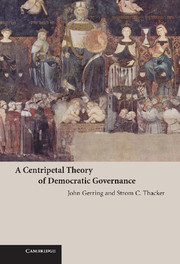Book contents
- Frontmatter
- Contents
- List of Figures
- List of Tables
- Acknowledgments
- A Centripetal Theory of Democratic Governance
- 1 Models of Governance
- PART ONE CAUSAL MECHANISMS
- PART TWO EMPIRICS
- PART THREE CONCLUSIONS
- Appendix A Defining Good Governance
- Appendix B Alternative Theories Revisited
- Sources
- Author Index
- Subject Index
Appendix A - Defining Good Governance
Published online by Cambridge University Press: 06 July 2010
- Frontmatter
- Contents
- List of Figures
- List of Tables
- Acknowledgments
- A Centripetal Theory of Democratic Governance
- 1 Models of Governance
- PART ONE CAUSAL MECHANISMS
- PART TWO EMPIRICS
- PART THREE CONCLUSIONS
- Appendix A Defining Good Governance
- Appendix B Alternative Theories Revisited
- Sources
- Author Index
- Subject Index
Summary
This book purports to describe the political-institutional foundations of good governance within democratic polities. We operationalize this ineffable concept across three policy areas – political development, economic development, and human development – each of which we capture with several empirical indicators (see chapter six). We believe that each of these indicators has a fairly clear normative valence: it is good, or bad, for governance. Yet the reader may wonder how we arrived at this determination. What is “good governance,” anyway? Does it mean anything at all? Or worse, is it simply a misleading label for a particular ideological agenda?
Arguably, the concept of good governance functions as a rhetorical mask for views propounded by international financial institutions (e.g., the World Bank, the IMF, the WTO), economists, the United States, and a crop of neoliberal reformers around the world. Indeed, the term's rise in popularity coincides suspiciously with the rise of the “Washington Consensus” policy model in the late 1980s and 1990s. There is, in short, ample reason for skepticism when approaching this vexed term.
If there is no current consensus over what good governance means (in policy- and outcome-specific terms), and if no such consensus is likely to be forthcoming, then any choice of policies and policy outcomes must be viewed as highly arbitrary, and all causal arguments based upon those outcomes will have no clear normative implications, or will be tied to problematic assumptions about the role of government.
- Type
- Chapter
- Information
- A Centripetal Theory of Democratic Governance , pp. 165 - 178Publisher: Cambridge University PressPrint publication year: 2008



